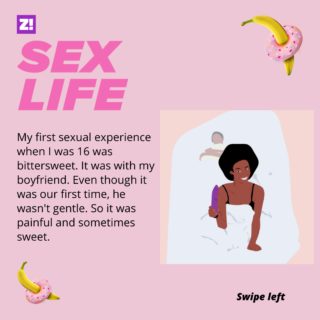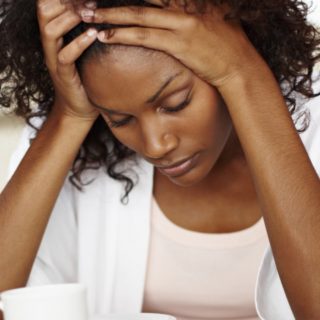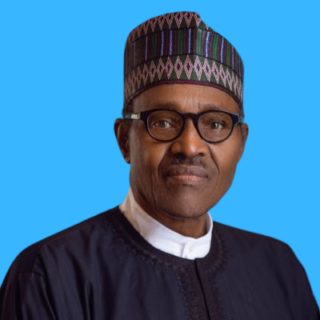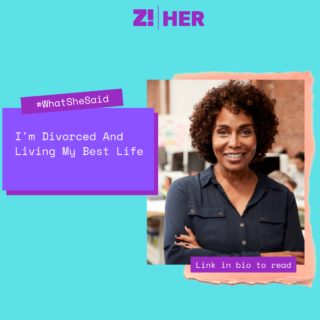The subject of this week’s What She Said is Karo Omu, a 29-year-old Nigerian woman and mother. She talks about almost having a miscarriage when she was five weeks pregnant, liking her daughter and the importance of giving women enough information about reproductive health.
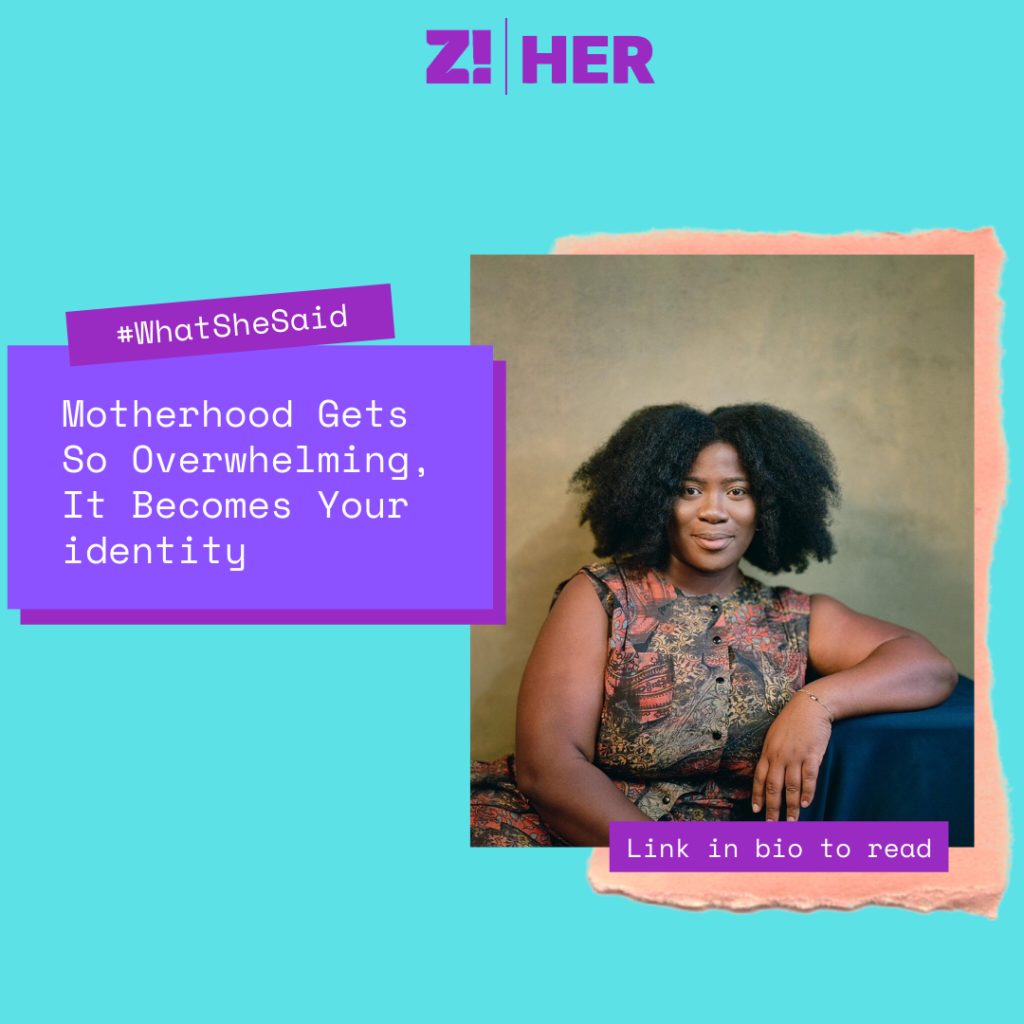
Did you always know you wanted to have a child?
Yeah, but I don’t think I did consciously. I think when you’re a young girl, it’s normal to think that you would go on to start a family. I always thought I wanted many children, but I didn’t think about how I’d end up having them. I am from a big and close-knit family, so I wanted a big family too.
What was growing up like?
I have four sisters and a brother. My brother is the last child, so maybe my mum favoured him a little, but my dad was really big on his daughters. In our house, being a girl or a boy wasn’t that different. My mum had nine siblings; eight girls and one boy. Her mum really wanted a boy, and I think my mum was conscious of this — having a boy. My dad on the other hand came from a family with many girls and boys and was more progressive, so he didn’t seem to care.
So what was your pregnancy experience like?
I think before our generation, pregnancy seemed like a normal thing: you’d get pregnant and have a child. Nobody spent time speaking about the journey; instead, they talked about the labour. I found out really early about my pregnancy — in about the 2nd or 3rd week. I had two near miscarriages. I took a trip when I was five weeks pregnant, and on the flight, I noticed I was bleeding. I didn’t know flying wasn’t good for someone who was newly pregnant. As soon as I landed, I was taken to the airport clinic. I remember someone saying, “She’s in her first trimester, this happens all the time. It’s just tissue. If it’ll stay, it’ll stay.”
Wow.
I was like, what the hell is happening? I went back home in Nigeria and had a similar experience. I went to the hospital and the doctor did a test and told me that my body didn’t recognise I was pregnant, so it wasn’t producing hormones to take care of the baby growing inside me. I had to start taking hormone injections; I had never heard anybody speak about this. I couldn’t fly till I was past my first trimester.
The rest of my pregnancy was uneventful. But because of the anxiety I developed in my first trimester, I was always worried; I would wake up every day to see if my baby was moving. It got so crazy, I bought a heart monitor to listen to her heartbeat. That was something I wasn’t prepared for. When we talk about how people don’t talk about pregnancy, it’s mostly because everybody’s experience is so different that there’s almost nothing to go by.
Fair enough.
Yeah. I didn’t have a physically tough pregnancy, but it was mentally tough for me as I was in a different city by myself, with only my husband. It was really lonely not having my extended family around. My baby was overdue for over two weeks, and my mum was like, this has never happened in our family, it’s crazy. My pregnancy journey was long, enjoyable, beautiful, but I was mostly tired of being pregnant.
I can imagine. What has motherhood been like for you?
Haha. Very crazy. I like my daughter, so the more I like her, the more I like being her mother. But, it’s so tough. It took me a while to remember that I am separate from my child. Motherhood gets so overwhelming, it becomes all of your identity. But now, I really like being a mum. I like being my daughter’s mother; that’s part of my identity. It took me a while to accept it, by removing myself out of it, then choosing it. Knowing that this is part of my identity doesn’t make me feel less of who I am.
My daughter is three now. I went to work when she was seven weeks old because I felt like I really needed that. Then it got to a point where I felt I really needed to be at home with her; I did that. When the lockdown began, I realised that I have to be best friends with her because she’s an only child. She’s the reason I get out of bed on some days and that gives me a sense of purpose.
Compared to being born and raised in Nigeria, how has raising your child outside Nigeria been?
Growing up, I had a lot of extended family and friends around, which meant everybody had an opinion about how you were being raised, and it was so easy for that to be projected on your parents.There was a lot of “what will people say?” even in the littlest choices. While my child may not have that communal feeling, I get to raise her with less thought to what people will think. But, I think children like mine miss out on that familiarity and safety I had growing up.
What are some things you’re already worried about with raising your child?
I don’t know if it’s a Nigerian thing, but I hope my kid doesn’t have to hear a thing like, “What will you be doing in your husband’s house?” or “Let the boys go first.” I have always worked around social change, and my motivation is that I want my daughter to grow up in a better world.
When I was a child, I would wait till 4 p.m. before watching TV because that was when it came on. But for my kid’s generation, there is so much information they have access to, and I am conscious of the fact that it’s my responsibility to filter what my child is exposed to.
Also, she didn’t ask to be here so it is my responsibility to make her life work while also respecting her autonomy as a person. It’s very interesting and often challenging to navigate.
My parenting journey has made me even more passionate about women having adequate reproductive health information and resources. Children shouldn’t have to be born as a consequence to parents who don’t want to have them.
This makes me wonder about the work you do with Sanitary Aid. Is there a personal story there?
Just before I turned 10, my parents asked how I wanted to celebrate my birthday. That year, I had just found out what an orphanage was. I told my parents I wanted to take my cake to an orphanage, and they were so excited that they ended up letting me throw three parties: one at home, another in church and the third at an orphanage. It was almost like I was rewarded for that thought.
I became a volunteer teacher when the IDP camps started and gradually started getting involved in social work. My bishop then had adopted kids, and they became my friends. I would teach them, and whatever project I had begun with them.
I liked how it made me feel when people I worked with were happy, so it was almost like a selfish thing for me.
How did all of these lead to creating Sanitary Aid?
Sanitary Aid was a Twitter conversation about donating pads versus condoms. I remembered when I was in secondary school and my pocket money was 200 or 300 naira. There was no way I’d have been able to afford pads if they were sold for their current prices.
I had always thought about the issues affecting women and how we could make our lives better. Sanitary Aid was an avenue to help. Women having dignity and information was an agenda for us. It opened my eyes to how different experiences shape the things we do. I’m a feminist; to me feminism means equality because women lose so much to gender inequality. We lose so much time, respect, dignity and money to not being equal. This is one of the reasons I joined the Feminist Coalition, and the focus has been on how we can create more opportunities for women. I am very committed to conversations and work that promote women’s rights and give them visibility and help underserved communities.
This was how Sanitary Aid started, and a few weeks after that, I found out I was pregnant. I didn’t know what I was getting into when it just began.
How were you able to manage Sanitary Aid while pregnant?
It’s just kudos to my team and family because they have always supported the project. We have grown into a full blown organisation and have public support. So, people who want to help do it on behalf of the organisation. That gap existed and all that was needed was a conversation to be had, which we did.
It would have succeeded with or without me because there are always people willing to do something about the problems we have in the society.
What challenges do you and the organisation face?
Some of the challenges are that some things, such as getting approval, take so much time. Then there is financial constraint. It’s important for me to create spaces where women can talk and be heard and question why we find things more appealing when we hear it from men than from women who are the ones experiencing this thing.
One thing that always happens in this kind of work is that there is always going to be somebody else, and I’m totally not against so many people doing the same thing. If I wake up tomorrow and realise that there is no more period poverty, I’d be so happy regardless of who made that happen. As long as people are making change, that’s great. But, it’s also important that we question ourselves on why we are not listening when women are saying the same thing.
What does success look like for Sanitary Aid?
It’s a lot of things: it’s getting to the point where we have our social enterprise that will fund Sanitary Aid. Currently, we rely on partnerships and donations, which aren’t sustainable. I am very big on sustainability because so many people depend on us, and we can’t afford to crash and fall out of what we are doing. Success will also be having policies that tackle period poverty, even if it’s the government giving out free pads to girls. Also, we want to get to a place where we have funding for research in Nigeria on women’s reproductive health and reaching more girls and women. Success for us is a lot of things, but it’s mostly us being able to fund ourselves, more girls and women having access to sanitary pads and hygiene education. Period poverty is a by-product of poverty, so without tackling poverty and the issues that stop women and girls from having access to sanitary pads and makes them choose less hygienic means, we are never going to get to where we need to get to as a country.
We need to tackle poverty head-on. Not having access to information on Sexual and Reproductive health has a long term effect on women’s lives. I hope we get to where even the government is talking about the importance of menstrual hygiene and having access to quality and affordable products.
For more stories like this, check out our #WhatSheSaid and for more women like content, click here

